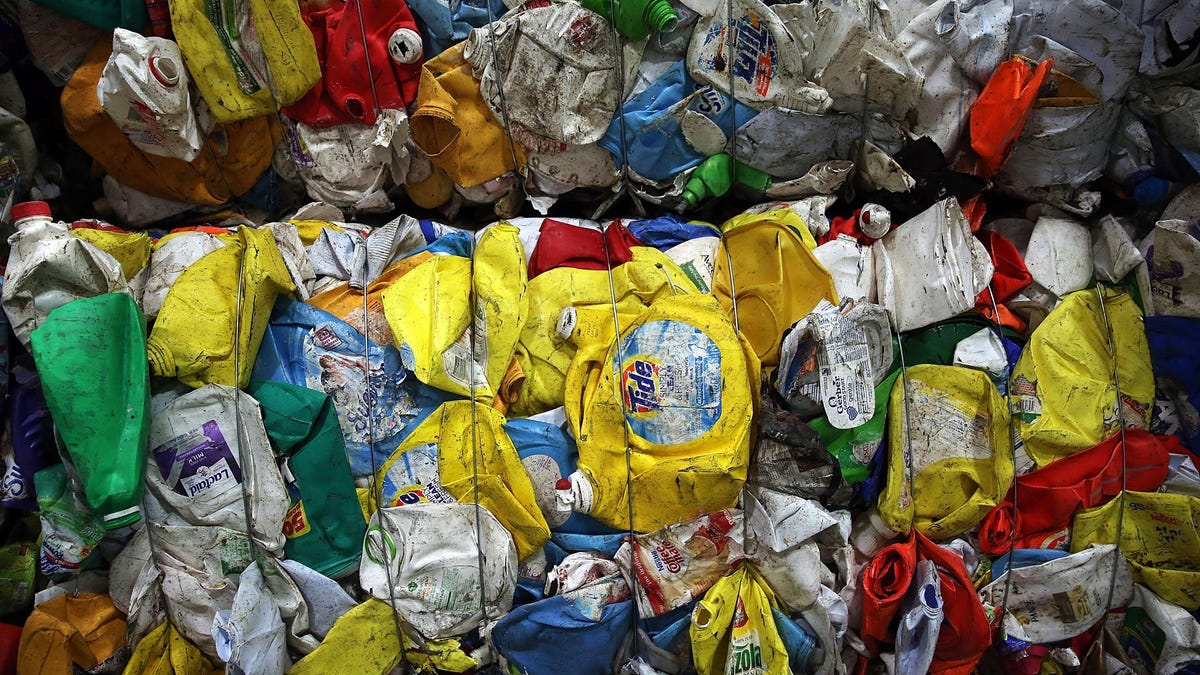This story was originally published by Grist. Sign up for Grist’s weekly newsletter here.
The HP Spectre Fold: One Device, Three Modes, All Meh
As plastic litter builds up in the environment, polluting landscapes and poisoning ecosystems, U.S. lawmakers have unveiled their “most comprehensive plan ever” to tackle the problem.
Three Democratic members of Congress on Wednesday introduced the Break Free From Plastic Pollution Act of 2023, a sweeping bill to reduce plastic production and hold companies financially responsible for their pollution. Previous iterations of the legislation were introduced in 2020 and 2021, but this year’s version includes stronger protections for communities that live near petrochemical facilities, more stringent targets for companies to reduce their plastic production, and stricter regulations against toxic chemicals used in plastic products.
“Our bill tackles the plastic pollution crisis head on, addressing the harmful climate and environmental justice impacts of this growing fossil fuel sector and moving our economy away from its overreliance on single-use plastic,” Representative Jared Huffman of California said in a statement. Huffman co-sponsored the bill with Senator Ed Markey of Massachusetts and lead author Senator Jeff Merkley of Oregon.
As U.S. demand for fossil fuel-powered heating, electricity, and transportation declines, fossil fuel companies are pivoting to plastic and are on track to triple global plastic production by 2060. Meanwhile, plastic pollution has reached crisis levels as litter clogs the marine environment and microplastics continue to be found on remote mountain peaks, in rainfall, and in people’s hearts, brains, and placentas. Plastic production also releases greenhouse gas emissions and other pollutants that disproportionately affect marginalized communities.
Like the bill’s earlier versions, Break Free 2023 would establish a nationwide policy of “extended producer responsibility,” or EPR. Under this policy, plastic companies would pay membership fees to a centralized organization that’s responsible for meeting targets around post-consumer recycled content and source reduction — reducing the production of plastic. The bill also retains proposals to ban certain single-use plastic products, implement a national system offering people deposits for recycling their beverage bottles, increase post-consumer recycled content in plastic bottles, and place a moratorium on new or expanded petrochemical facilities, pending a federal review of their health and environmental impacts.
The new bill, however, sets more specific targets for source reduction. By 2032, it would require plastic producers to reduce the amount of plastic they make by 25 percent — by weight, as well as the number of plastic items — and then halve it by 2050, in line with nation-leading requirements set in California last year. The bill would also phase out a list of “problematic and unnecessary” types of plastic and plastic additives, including polyvinyl chloride, a kind of plastic whose main ingredient is a human carcinogen, and ingredients added to help plastics break down whose health effects are poorly understood.
To mitigate some of the harms of plastic production, Break Free 2023 folds in environmental justice requirements from a separate bill introduced in Congress last December, the Protecting Communities From Plastic Act. These include greater communication and community outreach requirements for petrochemical companies that want to open a new factory for plastic production or chemical recycling, in the event that the moratorium on new petrochemical facilities is lifted.
This is the third time that a version of the plastics bill has been introduced in Congress, and it faces unlikely odds of passage. “Sadly, the makeup of Congress has not changed significantly over the course of Break Free being introduced, and we’re not set up well to move this bill at this time as a comprehensive package,” said Anja Brandon, associate director of U.S. plastics policy for the nonprofit Ocean Conservancy.
But there are other ways for the bill to make an impact. Smaller sections could be turned into their own federal bills, or they could influence policies at the state and local level. Merkley has been exploring a separate bottle deposit bill that could draw from the Break Free proposal. Brandon also pointed to proposed bans on specific products like single-use plastic cutlery and plastic foam foodware, which would be easier to pass on their own than as part of the whole Break Free package.
The Plastics Industry Association, a trade group representing U.S. plastics companies, said in a statement that the new bill was “even worse and less collaborative” than the previous versions, adding that it would “negatively impact the American economy” and lead to more greenhouse gas emissions, since plastics are lighter than some alternative materials and require less fuel to transport. “Instead of one-sided proposals that don’t move us forward, we need to work together to craft sound policy that will actually help our environment,” Matt Seaholm, the organization’s president and CEO, said in a statement, although he didn’t specify which kind of policy the group supports.
Brandon, with Ocean Conservancy, invited the plastics industry to collaborate with the nearly 100 organizations that are backing the Break Free bill. “It’s time for them to get on board,” she said. “The onus is on those companies and those producers of this waste to join us at the table and be a part of the solution.”
This story has been updated to clarify that Senator Jeff Merkley was the lead author of the new bill.
This article originally appeared in Grist at https://grist.org/politics/democrats-unveil-most-comprehensive-plan-ever-to-address-plastics-problem/. Grist is a nonprofit, independent media organization dedicated to telling stories of climate solutions and a just future. Learn more at Grist.org
